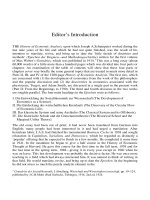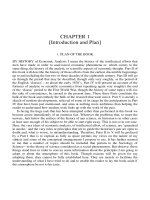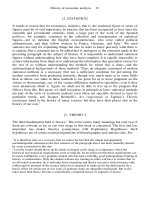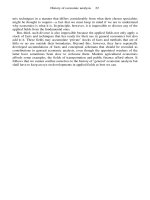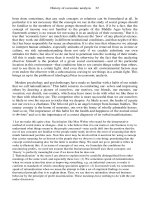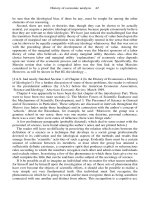History of Economic Analysis part 1 pps
Bạn đang xem bản rút gọn của tài liệu. Xem và tải ngay bản đầy đủ của tài liệu tại đây (290.36 KB, 10 trang )
HISTORY OF ECONOMIC ANALYSIS
HISTORY OF ECONOMIC
ANALYSIS
BY
JOSEPH A.SCHUMPETER
EDITED FROM MANUSCRIPT BY
ELIZABETH BOODY SCHUMPETER
AND
WITH AN INTRODUCTION BY
MARK PERLMAN
First published in Great Britain in 1954 by Allen & Unwin (Publishers) Ltd
This edition published in the Taylor & Francis e-Library, 2006.
“To purchase your own copy of this or any of Taylor & Francis or Routledge's collection of
thousands of eBooks please go to www.eBookstore.tandf.co.uk.”
Twelfth impression 1981
First published in paperback 1986
This book is copyright under the Berne Convention.
© Introduction by Mark Perlman
All rights reserved. No part of this book may be reprinted or reproduced or utilized in any form or
by any electronic, mechanical, or other means, now known or hereafter invented, including
photocopying and recording, or in any information storage or retrieval system, without permission
in writing from the publishers.
British Library Cataloguing in Publication Data
A catalogue reference for this book is available from the British Library.
ISBN 0-203-98391-2 Master e-book ISBN
ISBN 0-415-10888-8 (Print Edition)
Table of Contents
INTRODUCTION BY
MARK PERLMAN
viii
EDITOR’S INTRODUCTION
xxx
PART I INTRODUCTION SCOPE AND METHOD
CHAPTER
1
INTRODUCTION AND PLAN
2
CHAPTER
2
INTERLUDE I: THE TECHNIQUES OF ECONOMIC
ANALYSIS
10
CHAPTER
3
INTERLUDE II: CONTEMPORANEOUS DEVELOPMENTS
IN OTHER SCIENCES
23
CHAPTER
4
THE SOCIOLOGY OF ECONOMICS
31
PART II FROM THE BEGINNINGS TO THE FIRST CLASSICAL SITUATION
(TO ABOUT 1790)
CHAPTER
1
GRAECO-ROMAN ECONOMICS
48
CHAPTER
2
THE SCHOLASTIC DOCTORS AND THE PHILOSOPHERS
OF NATURAL LAW
70
CHAPTER
3
THE CONSULTANT ADMINISTRATORS AND THE
PAMPHLETEERS
139
CHAPTER
4
THE ECONOMETRICIANS AND TURGOT
202
CHAPTER
5
POPULATION, RETURNS, WAGES, AND EMPLOYMENT
240
CHAPTER
6
VALUE AND MONEY
264
6
CHAPTER
7
THE ‘MERCANTILIST’ LITERATURE
318
PART III FROM 1790 TO 1870
CHAPTER
1
INTRODUCTION AND PLAN
358
CHAPTER
2
SOCIO-POLITICAL BACKGROUNDS
371
CHAPTER
3
THE INTELLECTUAL SCENERY
384
CHAPTER
4
REVIEW OF THE TROOPS
438
CHAPTER
5
GENERAL ECONOMICS: A CROSS SECTION
502
CHAPTER
6
GENERAL ECONOMICS: PURE THEORY
548
CHAPTER
7
MONEY, CREDIT, AND CYCLES
657
PART IV FROM 1870 TO 1914 (AND LATER)
CHAPTER
1
INTRODUCTION AND PLAN
721
CHAPTER
2
BACKGROUND AND PATTERNS
727
CHAPTER
3
SOME DEVELOPMENTS IN NEIGHBORING FIELDS
749
CHAPTER
4
SOZIALPOLITIK AND THE HISTORICAL METHOD
768
CHAPTER
5
THE GENERAL ECONOMICS OF THE PERIOD: MEN AND
GROUPS
793
CHAPTER
6
GENERAL ECONOMICS: ITS CHARACTER AND
CONTENTS
853
CHAPTER
7
EQUILIBRIUM ANALYSIS
918
CHAPTER
8
MONEY, CREDIT, AND CYCLES
1040
PART V CONCLUSION A SKETCH OF MODERN DEVELOPMENTS
CHAPTER
1
INTRODUCTION AND PLAN
1104
CHAPTER
2
DEVELOPMENTS STEMMING FROM THE MARSHALL-
WICKSELL APPARATUS
1114
CHAPTER
3
ECONOMICS IN THE ‘TOTALITARIAN’ COUNTRIES
1119
CHAPTER
4
DYNAMICS AND BUSINESS CYCLE RESEARCH
1126
CHAPTER
5
KEYNES AND MODERN MACROECONOMICS
1136
EDITOR’S APPENDIX
1151
LIST OF BOOKS FREQUENTLY QUOTED
1171
AUTHOR INDEX
1174
SUBJECT INDEX
1218
Introduction
MARK PERLMAN
*
There is, as we shall see, much in this book which is
redundant, irrelevant, cryptic, strongly biased, paradoxical,
or otherwise unhelpful or even harmful to understanding.
When all this is set aside, there still remains enough to
constitute, by a wide margin, the most constructive, the
most original, the most learned, and the most brilliant
contribution to the history of the analytical phases of our
discipline which has ever been made. (Viner 1954, pp.
894–5).
I PUTTING SCHUMPETER AND HISTORIES
OF ECONOMIC THOUGHT IN PERSPECTIVE
1.1 Schumpeter was a man of many interests as well as talents. Beyond that he had,
certainly as a young man, monumental ambitions. It is not appropriate in this essay to
devote much space to the journey of his life; fortunately there are now available not only
the 1950 insightful memorials by his colleagues, particularly the one by Gottfried
Haberler,
1
a massive as well as a magnificent piece of bibliographical scholarship on
what he wrote, who wrote about him, and with whom was he most frequently compared
by Massimo M.Augello (1990),
2
but also three recent (1991) and assuredly major
biographies of the man. Schumpeter, A Biography by Richard Swedberg contains a
particularly carefully balanced, scholarly assessment of
*
Thanks are owed to several friends who have read and corrected the manuscript: Professors
A.W.Coats, Warren Samuels, Yuichi Shionoya, Richard Swedberg and Shigeto Tsuro, and Dr
Charles McCann.
1
This essay appeared originally in the Quarterly Journal of Economics. It was reprinted in
Seymour Harris’s edited volume, Schumpeter, Social Scientist (Harris, 1951) and again in Haberler
(1993). The 1951 volume also contained essays by 16 leading economists, including inter alia
Ragnar Frisch, Arthur Smithies, Paul A.Samuelson, Jan Tinbergen, and Fritz Machlup.
2
Augello cites 260 works (including articles and books translated into languages other than the
original) by Schumpeter and 1916 works on Schumpeter. Augello’s own generalizations or findings
are in a comprehensive 93-page essay, replete with valuational (that is, Augello’s straightforward
evaluations) notes. I am not aware of a comparable task done recently by any economist on an
economist.
Schumpeter’s four or five major efforts as well as an intriguing general account of the
times and environments in which he lived. Swedberg discusses ad seriatim the various
decades of Schumpeter’s life and work, and if he attempts to explain the man, he does so
only by inference.
The second biography is different. Opening Doors: The Life and Work of Joseph
Schumpeter by Robert Loring Allen has more of the characteristics of James Boswell’s
The Life of Samuel Johnson, LL.D. or Samuel Pepys’ Diary (1815). Benefitting greatly
from the massive, scholarly, even daunting
3
task of deciphering Schumpeter’s personal
diaries undertaken by Mrs Erica Mattschnigg Gershenkron,
4
Allen interpreted the often
elliptical, if not actually obscure, materials. Unlike Swedberg (a sociologist), Allen (an
economist) was a much-impressed, even overwhelmed, Schumpeter student. Allen
documents much of what Swedberg could do no more than infer.
The third biography, Joseph Schumpeter: Scholar, Teacher, and Politician by Edward
März, a Viennese Marxian historian, eschews not only discussion of Schumpeter, the
idiosyncratic individual, but virtually all mention of Schumpeter’s historico-cultural-
epistemological interests. März’s effort is to fit Schumpeter into the ranks of latter-day
Marxians, an interesting effort but one hardly germane to what we are interested in. For
that reason, what follows is based in large measure on the memorials and the other two
studies.
1.2 I believe that Schumpeter’s intellectual efforts centered on five (possibly four and
a half) major projects. I would classify the first burst of effort (including three books) as
at least two major projects, one involving the nature of economic theory and economic
science and the other concentrating on the nature and sources of economic development.
The first surfaced in the 1908 Das Wesen und der Hauptinhalt der theoretischen
Nationalökonomie (The Nature and Essence of Theoretical Economics) and to a lesser
degree in the 1914 Der Dogmen- und Methodengeschichte (Economic Method and
Doctrine: An Historical Sketch)
5
; the second in the 1911 Theorie der wirtschaftlichen
Entwicklung (The Theory of Economic Development).
His next (I would term it the third) major effort involved a book on money (partly
written but never published by him although it did appear in 1970 as Das Wesen des
Geldes
6
) and his 1939 two-volume Business Cycles. This generally unsuccessful effort
paralleled Maynard Keynes’s 1930 abortive Treatise on Money and his thoroughly
successful 1936 General Theory of Employment, Interest, and Money.
Schumpeter did not think that his Capitalism, Socialism, and Democracy was a major
effort; indeed he ‘often called it a “pot-boiler”’ (Allen, 1992, II, p. 133). Others have not
shared that assessment, and it may well be termed Effort ‘Three and a Half’ or even Four.
3
The task was daunting because much was written, even scribbled, in an archaic German
shorthand.
4
I am indebted to Professor Yuichi Shionoya for this information and other points, too.
5
This book was essentially the basis for the last effort. However, as Schumpeter thought all study
of economic theory involves knowledge of its origins, at the time (pre-World War I) he linked the
two.
6
Edited and introduced by F.K.Mann. Göttingen: Vandenhöck & Ruprecht, 1970, pp. xxvii, 341.



